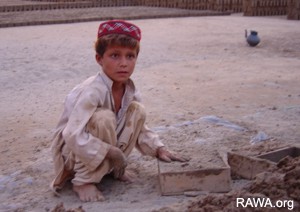Continuing poverty means many children, including some as young as six, are forced to work to help their families.


IRIN News, January 16, 2007: A survey released by the AIHRC revealed that 60 percent of families surveyed stated that almost half their children were involved in some kind of labour.
Afghanistan has signed and ratified the 1989 Convention on the Rights of the Child which states that children should be protected from dangerous work.
As countries around the world mark Universal Children's Day on Thursday, the BBC's Afghan service spoke to some young workers in the capital of Helmand province, Lashkar Gah.
'I'm poor'
Twelve-year-old Izatullah was pushing a cart containing heavy sacks of flour.
"I take this load to another shopkeeper. They will give me 10 or 20 Afghanis (21 pence or 42pence). I am poor, I don't have bread. My father is an old man. I earn our living," he said.
Sohrab, who is only nine, works in a carpenter's shop.
"We make doors and sell them. Before I was in school. But now I've been told not to go any more because there is a lot of work here in the shop," he said.
Another child worker, Naik Mohammed, said his family came to Lashkar Gah after being displaced by fighting in another part of Helmand.
But, he says, he is luckier as he only works in the morning and attends school in the afternoon.
His father, Khawaja Mohammed, is distressed that he has to send his son to work at all.
"Our house was destroyed. We lost our land and our property. Accommodation here costs between 5,000 to 10,000 Afghanis ($105 - $210). One sack of flour is 3,000 Afghanis ($63).
"We have no other option but to ask the children to work. You saw my child yourself. He is not strong enough to work. You can see his condition. But we don't have any other option."
Tens of billions of dollars in aid have flowed into Afghanistan since the fall of the Taliban in 2001.
But many ordinary Afghans still struggle to make a living; and for now, many parents have little choice but to continue to send their children to work.



